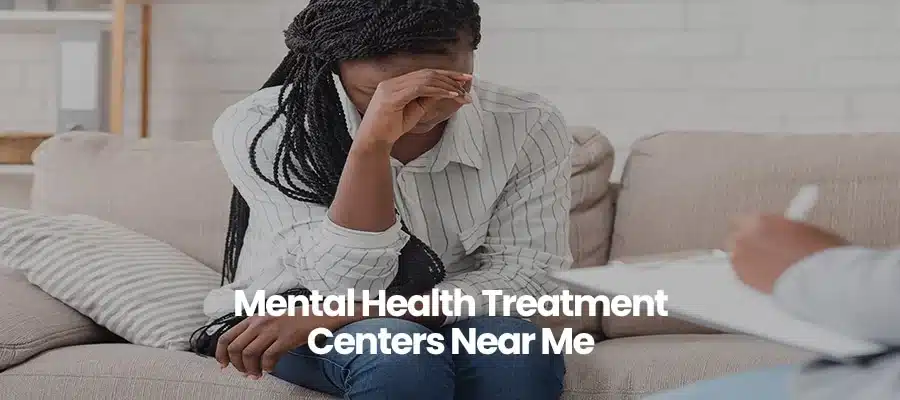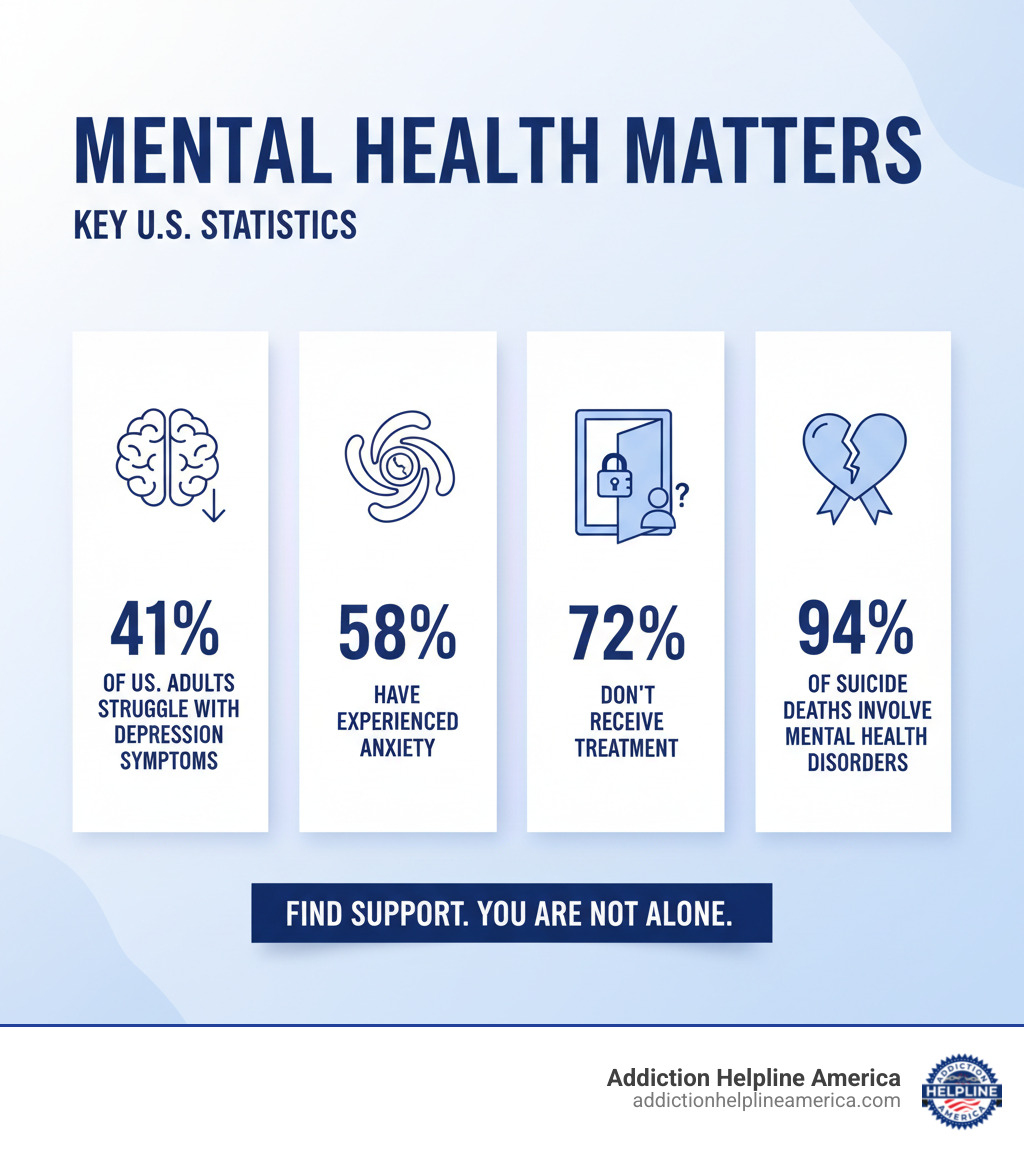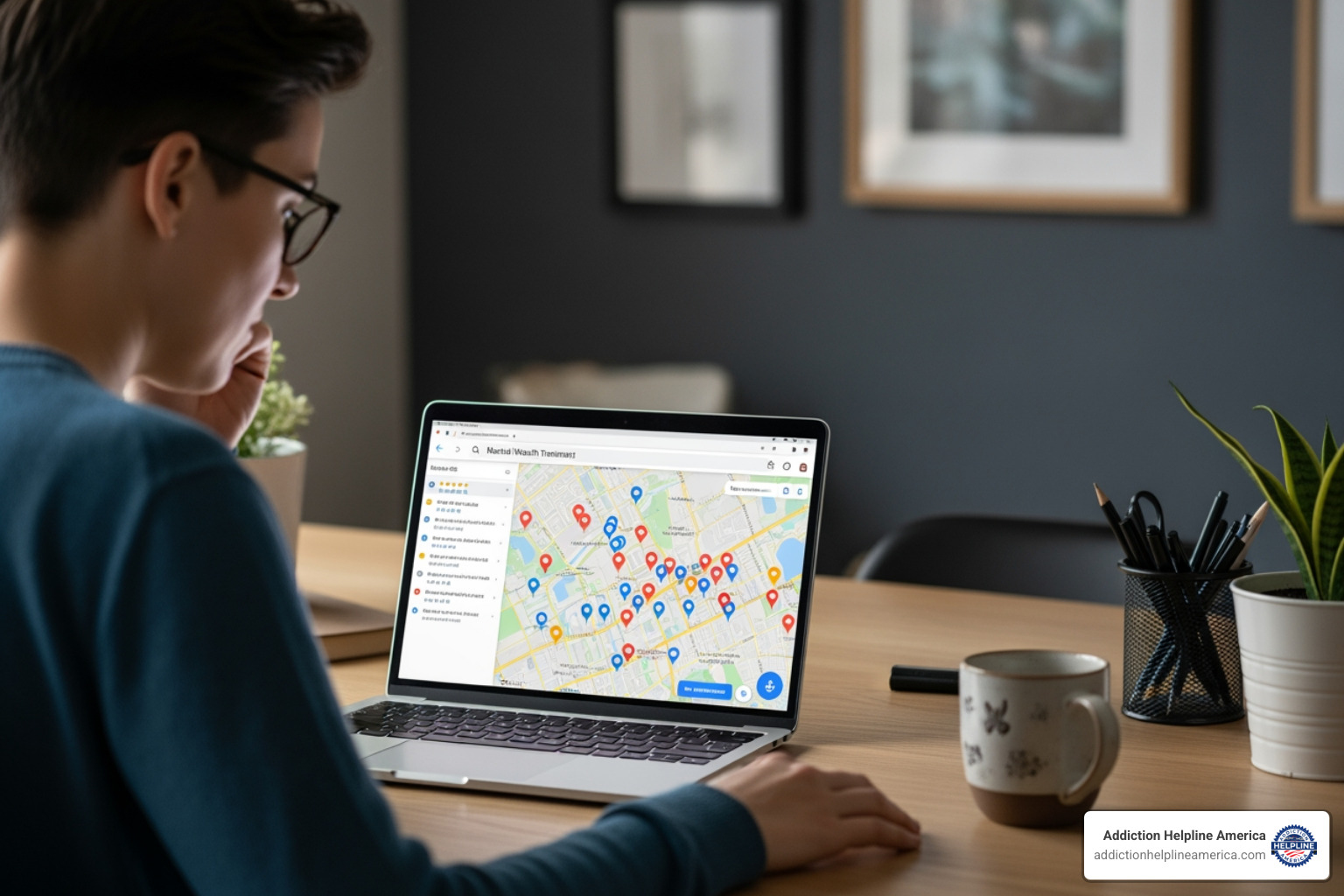
Why Finding the Right Mental Health Support Matters Now More Than Ever
Searching for mental health treatment near me is often the first step people take when they or a loved one need professional help. The statistics are sobering: 41% of Americans struggle with depression symptoms, and 58% have experienced anxiety. Yet, a staggering 72% of people who need mental health treatment don’t receive it. This gap represents millions suffering in silence, unsure where to turn.
Here’s a quick guide to get you started:
- Immediate Crisis Help: Call or text 988 for the Suicide & Crisis Lifeline (24/7, free, and confidential).
- Find Local Treatment: Use confidential directories like FindTreatment.gov or contact Addiction Helpline America at 844.561.0606.
- Types of Care: Options range from Residential (24/7 live-in care) and Day Treatment/PHP (intensive daily therapy) to Outpatient (weekly counseling) and Telehealth.
- Conditions Treated: Programs address depression, anxiety, bipolar disorder, PTSD, OCD, co-occurring disorders, and more.
- Payment Options: Private insurance, Medicaid, Medicare, sliding scale fees, and payment assistance are often available.
Whether you’re in crisis, managing a long-term condition, or supporting a loved one, finding the right treatment can feel overwhelming. The good news is that comprehensive, evidence-based mental health treatment is more accessible than you might think.
At Addiction Helpline America, we specialize in connecting individuals with mental health treatment options that match their unique needs. We provide confidential guidance 24/7 to help you or your loved one take that crucial first step toward recovery.
Understanding the Different Types of Mental Health Treatment
When you search for mental health treatment near me, you’ll find a spectrum of options designed to meet people where they are. Quality programs focus on individualized care, tailoring the approach to your specific needs, age, and circumstances. The expansion of telehealth options also means that quality support is accessible even if you live in a rural area or have transportation challenges.
Let’s look at the main types of treatment programs:
| Treatment Type | Key Characteristics | Ideal For |
|---|---|---|
| Residential Treatment | 24/7 care and support, live-in facility, structured daily schedule, integrated therapies, private rooms. | Individuals needing constant supervision, stabilization, or a therapeutic environment away from daily stressors. |
| Day Treatment (PHP) | Partial Hospitalization Program, intensive therapy Monday through Friday, clients live at home, more intensive than weekly outpatient, less restrictive than residential. | Those needing significant daily support but can safely return home, stepping down from residential, or stepping up from IOP. |
| Outpatient (IOP, Weekly) | Intensive Outpatient Program (IOP) offers several hours of therapy multiple days a week; weekly therapy is once or twice a week. | Individuals with stable conditions, managing symptoms, or transitioning from more intensive programs. |
Residential and Inpatient Programs
Sometimes, healing requires stepping away from daily life to focus completely on recovery. Residential and inpatient programs provide a safe space with 24/7 care and a structured schedule.
- Inpatient facilities are typically hospital-based and focus on acute medical stabilization for severe crises. Stays are often short-term, aimed at managing immediate risks and providing rapid psychiatric intervention. You can learn more about inpatient facilities for mental health through our resources.
- Residential treatment centers offer a more home-like, therapeutic environment. While providing 24/7 care, the focus shifts to longer-term therapy and skill-building. Days are filled with counseling, group sessions, and holistic wellness practices to help you rebuild healthy routines away from daily stressors.
Outpatient Programs (PHP, IOP, and Weekly Therapy)
Outpatient programs offer the flexibility to get help while maintaining your daily life. You can attend therapy and return home each day, applying what you learn in your real-world environment.
- A Partial Hospitalization Program (PHP), or day treatment, is the most intensive outpatient option. It involves several hours of therapy daily, five days a week, offering hospital-level intensity without the overnight stay.
- Intensive Outpatient Programs (IOP) are slightly less intensive, with a few hours of therapy three to five days a week. This structure allows you to balance treatment with work or school.
- Weekly counseling is the most common form of therapy, involving meetings with a therapist once or twice a week to manage ongoing symptoms and develop coping skills.
If you’re dealing with depression, exploring outpatient depression treatment centers near me can connect you with programs designed for your needs.
What Conditions Are Treated and What Therapies Are Used?
Modern mental health care uses evidence-based approaches—therapies scientifically proven to work. When you search for mental health treatment near me, you’ll find facilities equipped to address a wide spectrum of concerns with the goal of supporting holistic, lasting wellness.
Common Mental Health Conditions
Treatment centers help children, adolescents, and adults with numerous conditions:
- Depression: Persistent sadness and loss of interest. Find resources at best depression treatment centers near me.
- Anxiety Disorders: Including generalized anxiety, panic disorder, and social anxiety, characterized by excessive worry and fear.
- Bipolar Disorder: Significant mood swings between mania and depression.
- PTSD (Post-Traumatic Stress Disorder): Develops after a traumatic event, causing flashbacks, nightmares, and severe anxiety.
- OCD (Obsessive-Compulsive Disorder): Unwanted thoughts (obsessions) and repetitive behaviors (compulsions).
- Co-occurring Disorders (Dual Diagnosis): The presence of both a mental health disorder and a substance use disorder, which requires integrated treatment.
- Schizophrenia, Borderline Personality Disorder (BPD), and Emotional Dysregulation: Conditions involving distorted thinking, unstable moods, and difficulty managing emotions.
- Suicide Ideation and Self-Harm: These serious symptoms require immediate, specialized care to ensure safety.
Evidence-Based Therapeutic Approaches
Effective mental health treatment near me relies on proven therapies:
- Cognitive Behavioral Therapy (CBT): Helps identify and change negative thinking patterns and behaviors. It’s highly effective for depression, anxiety, and OCD.
- Dialectical Behavior Therapy (DBT): A specialized CBT that teaches skills in mindfulness, distress tolerance, emotion regulation, and interpersonal effectiveness. It’s beneficial for BPD and chronic suicidal ideation.
- Exposure and Response Prevention (ERP) & Prolonged Exposure (PE): Gold-standard treatments for OCD and PTSD, respectively, that help individuals confront and process their fears.
- Experiential Therapy: Uses activities like art, music, or recreation to help process emotions and build coping skills.
- Medication Management: Psychiatrists work with you to find appropriate medications to stabilize symptoms and improve therapy.
- Transcranial Magnetic Stimulation (TMS): A non-invasive procedure that uses magnetic fields to stimulate nerve cells in the brain to improve depression symptoms.
Programs also integrate psychiatry, psychology, individual and family therapy, primary care, and spiritual care to address the whole person. For specific conditions, specialized approaches are used, such as those for narcissistic personality disorder treatment.
How to Find Mental Health Treatment Near Me
Finding the right care shouldn’t feel like navigating a maze alone. When you’re ready to search for mental health treatment near me, knowing where to look and what to ask can make all the difference.
As you explore options, consider what matters most. Do you need a specific therapy like DBT? Is 24/7 residential care necessary, or would an outpatient program work better? Answering these questions will help narrow your search.
When you find a potential facility, don’t hesitate to ask about their treatment philosophy, staff credentials, and success rates. The admission process typically starts with a screening to determine the appropriate level of care, followed by insurance verification to clarify costs.
Using Trusted Directories and Resources to Find Mental Health Treatment Near Me
Starting with verified directories can save you time and stress.
At Addiction Helpline America, our mission is to connect people with the right care. Our directory includes a vast network of treatment centers nationwide. When you call us, you get personalized, confidential guidance from someone who understands. We listen to your situation and help you find programs that match your needs, free of charge.
Another excellent resource is FindTreatment.gov, a confidential tool from SAMHSA. It allows you to search for facilities across the U.S. and filter by type of care (outpatient, residential, telemedicine), payment methods (Medicaid, private insurance, sliding scale), specialized programs (for veterans, young adults, etc.), and language accessibility.
Always call a facility before committing to confirm they offer the services you need and to ask about availability.
Understanding Local and State Options for Mental Health Treatment Near Me
Don’t overlook local and state-specific resources, which provide crucial support.
Our network at Addiction Helpline America includes facilities across the country. Each state has its own ecosystem of mental health services. For example, Georgia residents can call the Georgia Crisis and Access Line (GCAL) 24/7 at 1-800-715-4225 for immediate crisis help and connections to local services, including mobile response teams.
Community mental health centers are another vital resource, often providing comprehensive services with income-based sliding scale fees. Non-profit organizations also offer support groups, peer counseling, and educational programs. A quick search for “[your state] mental health resources” can connect you with these localized supports, making mental health treatment near me a real, accessible option close to home.
What to Look for in a Quality Treatment Program
When searching for mental health treatment near me, you deserve a program that supports holistic healing. The best programs see you as a whole person, not just a diagnosis, and prepare you for life after treatment.
A Holistic and Integrated Approach
Quality treatment programs take a holistic and integrated approach, understanding that mental health is connected to physical health, relationships, and daily life. This begins with a multidisciplinary treatment team of psychiatrists, therapists, nurses, and other specialists who collaborate on your care.
Key components of this approach include:
- Integrated Primary Care: Addressing physical health issues like diabetes or chronic pain alongside mental health challenges in one setting.
- Nutritional Counseling: A dietitian helps you understand the connection between food and mood to develop eating habits that support recovery.
- Experiential and Recreational Therapies: Activities like art, music, or exercise serve as powerful tools for processing emotions and building confidence.
- Individualized Care Plans: Your treatment plan should be based on a thorough assessment and custom to your specific diagnoses, history, and goals. Cookie-cutter approaches don’t work.
The Role of Family and Aftercare Support
Recovery doesn’t end when a program is completed. The best mental health treatment near me options build support systems that extend beyond the facility walls.
Family involvement significantly improves long-term success. Quality programs offer family support and education, teaching loved ones about mental health conditions and how to create a supportive home environment. When your family understands, they become allies in your recovery.
As you progress, your team will create a transition plan. This may involve stepping down from residential care to day treatment, then to an outpatient program, allowing you to practice new skills with continued support.
Aftercare planning and relapse prevention are critical. Before you leave, you should have a clear plan with connections to community resources, support groups, and strategies for managing triggers. The goal is to equip you for a life of sustained wellness.
At Addiction Helpline America, we connect you with programs that offer these comprehensive elements. Call us at 833.308.5887 to find a facility that matches your priorities.
Frequently Asked Questions about Finding Mental Health Care
Searching for mental health treatment near me brings up many questions. Here are answers to some of the most common concerns to help you move forward with confidence.
How much does treatment cost and does insurance cover it?
Cost should not be a barrier to seeking help. Treatment costs vary, but there are options for nearly every financial situation.
- Private Insurance: Most facilities work with private insurance. Call your provider and the treatment center to understand your benefits and out-of-pocket costs.
- Medicaid or Medicare: Many quality programs accept government insurance.
- Self-Payment and Financial Aid: If you don’t have insurance, ask about self-pay rates, sliding scale fees based on income, or financial assistance programs.
Don’t let cost stop you from making the first call. Be upfront about your financial situation; admissions teams are there to help you find a solution.
What should I do if I need immediate help in a crisis?
If you or someone you know is in a mental health crisis, help is available immediately and it’s free.
- Call 911 if there is an immediate danger to life or safety.
- For urgent support, call or text 988 to reach the 24/7 Suicide & Crisis Lifeline. It’s free and confidential. Learn more at 988lifeline.org.
- Veterans can dial 988 and press 1 to connect with the Veterans Crisis Line.
- Many areas also have local crisis hotlines, like Georgia’s GCAL at 1-800-715-4225, which can dispatch mobile response teams.
Asking for help in a crisis is an act of courage. For more resources, visit our page on mental health hotlines for immediate support.
What is the difference between inpatient and residential treatment?
While both offer 24/7 care, inpatient and residential treatment serve different primary purposes.
Inpatient treatment occurs in a hospital setting and is for acute crises requiring immediate medical stabilization. The focus is on short-term safety and symptom management, often for a few days to a couple of weeks.
Residential treatment takes place in a non-hospital, home-like environment. It focuses on longer-term, comprehensive therapy and skill-building for individuals who are medically stable but need a structured, immersive environment to heal. Stays can last for weeks or months.
In short: inpatient is about getting through the immediate storm safely, while residential is about learning to build a stronger ship for the future. An admissions team can help you determine which level of care is right for you.
Conclusion
We hope this guide has equipped you to take the next step in your search for mental health treatment near me. Finding the right care can feel daunting, but you are not alone, and help is within reach.
We’ve covered the different levels of care, from intensive residential to flexible outpatient programs. We’ve discussed the conditions treated and the evidence-based therapies that work, like CBT and DBT. We’ve also shared practical ways to find quality programs using trusted directories and local resources.
The statistics are a stark reminder of the need: 41% of Americans struggle with depression, 58% with anxiety, and 72% of those who need treatment don’t get it. But recovery is happening every day for people who take the courageous first step to reach out for help.
At Addiction Helpline America, we understand what you’re going through. Our team is here 24/7 to provide free, confidential guidance. We have a vast network of trusted treatment facilities across the country and our goal is to help you find the specific program that matches your unique needs.
You deserve personalized support. We’ll help you steer insurance, admissions, and the other details so you can focus on getting better. A healthier, more hopeful future is waiting.
Find professional help today and let us help you steer the path to recovery. You don’t have to figure this out on your own—we’re here, and we’re ready to help.
Our helpline is 100%
free & confidential
If you or someone you care about is struggling with drug or alcohol addiction, we can help you explore your recovery options. Don’t face this challenge alone—seek support from us.
Programs
Resources
Will my insurance
cover addiction
treatment?
We're ready to help
Find the best
drug or alcohol treatment
center
Are you or a loved one struggling with addiction? Call today to speak to a treatment expert.

















